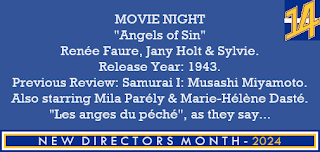Cast:
Renée Faure (Anne-Marie Lamaury), Jany Holt (Thérèse), Sylvie (La prieure), Mila Parély (Madeleine), Marie-Hélène Dasté (Mère Saint-Jean), Yolande Laffon (Madame Lamaury), Paula Dehelly (Mère Dominique), Silvia Monfort (Agnès), and Gilberte Terbois (Soeur Marie-Josèphe) Directed by Robert Bresson.
Review:
"There is the feeling that God is everywhere, and the more I live, the more I see that in nature, in the country. When I see a tree, I see that God exists. I try to catch and to convey the idea that we have a soul and that the soul is in contact with God. That's the first thing I want to get in my films."
Sure, we need a few French voices here and there. Famed director Jean-Luc Godard once wrote of Robert Bresson as "the French cinema, as Dostoevsky is the Russian novel and Mozart is German music." He had done painting in his young years. Bresson was most interested in film when it came to "everything that moved in films", whether that was the leaves on trees, for example. As such, he became a director with the short Les affaires publiques in 1934 (when he was 33), which was not particularly successful (to the point where it was thought lost for years). He served in World War II, only to find himself a prisoner of war for several months. In 1942, Pathe commissioned a film that found itself with Bresson as director (Synops later distributed it themselves). Bresson wrote the film with Raymond Léopold Bruckberger (a priest/writer) and Jean Giraudoux (a dramatist recruited because producers wanted someone well known). This was a film done during the German occupation of France in which he went with the idea of making a film about the Dominican Sisters of Bethany (which deals with visiting prisons). Bresson would go on to direct thirteen films as a feature director, from his debut here to films such as A Man Escaped (1956) to Pickpocket (1959) to Au Hasard Balthazar (1966) all the way to his final film in L'Argent (1983); viewers of him have called the film perhaps his most "conventional". Bresson died in 1999 at the age of 98. This was actually one of just two films (the other being his second effort in Les Dames du Bois de Boulogne [1945]) Bresson made with "professional actors". It basically is melodrama mixed with noir to make for a striking film to talk about religious piety without turning into a longwinded diatribe. In short: one really only finds freedom (spiritual or not) at a price.
It is a graceful film (known in France as Les anges du péché) one that is gripping in its solid minimal trappings. The differences between Faure and Holt don't end up being that different when it comes to that final sea of hands in clarity. This conflict of wills starts with Faure in that initial battle of belonging to a certain type of order that is not as easy to pin down as it seems. This powder keg of trying to live up to the form of virtuousness is not nearly as easy to pin as it looks. The 86-minute runtime is efficient in lending satisfactory judgement to look upon oneself for what spiritual pursuit can see itself unfold as they are meant to go. Holt is the sharp instrument of where things really lie in the clash of spiritual chase and biting hardness. Even nuns have their own collection of faults for others to potentially use against them, and it happens that, well, Faure's character is merely someone trying to find that calling as opposed to just being another well-off young lady. It takes plenty to answer a call of service and contemplation in the eyes of a higher power to be in a convent with other nuns, and the film gazes upon just what lies beneath the labels one can put on either of them (take a gaze upon how much time is spent away from the convent, particularly with Holt). You've got a nun early on talking about how they haven't seen themselves in a mirror in years right after they try cribbing a mirror from someone fresh to the convent, and it goes on from there for a film where people stand to the world ready to hear their flaws addressed. The film is haunting in its stark and sparse nature that shows a director ready to communicate with us involving the soul right from his very first feature film with no hesitation.
Overall, I give it 8 out of 10 stars.
I hope you folks enjoyed the second edition of New Directors Month in January. I wanted to balance the American and world cinema selections as closely as possible. There were a handful of finalists in films & new directors in the 10-review month that missed the cut, some of which were the following: The Spine of Night [Philip Gelatt and Morgan Galen King], New Women [Cai Chusheng], The Green Knight [David Lowery].
There may yet be a place to spotlight these films this year or whenever it seems appropriate. As always, suggestions are welcome. To put it bluntly, I believe Movie Night needs a reset to not suffer from burnout. As such, there won't be any reviews for the first week of February.


No comments:
Post a Comment